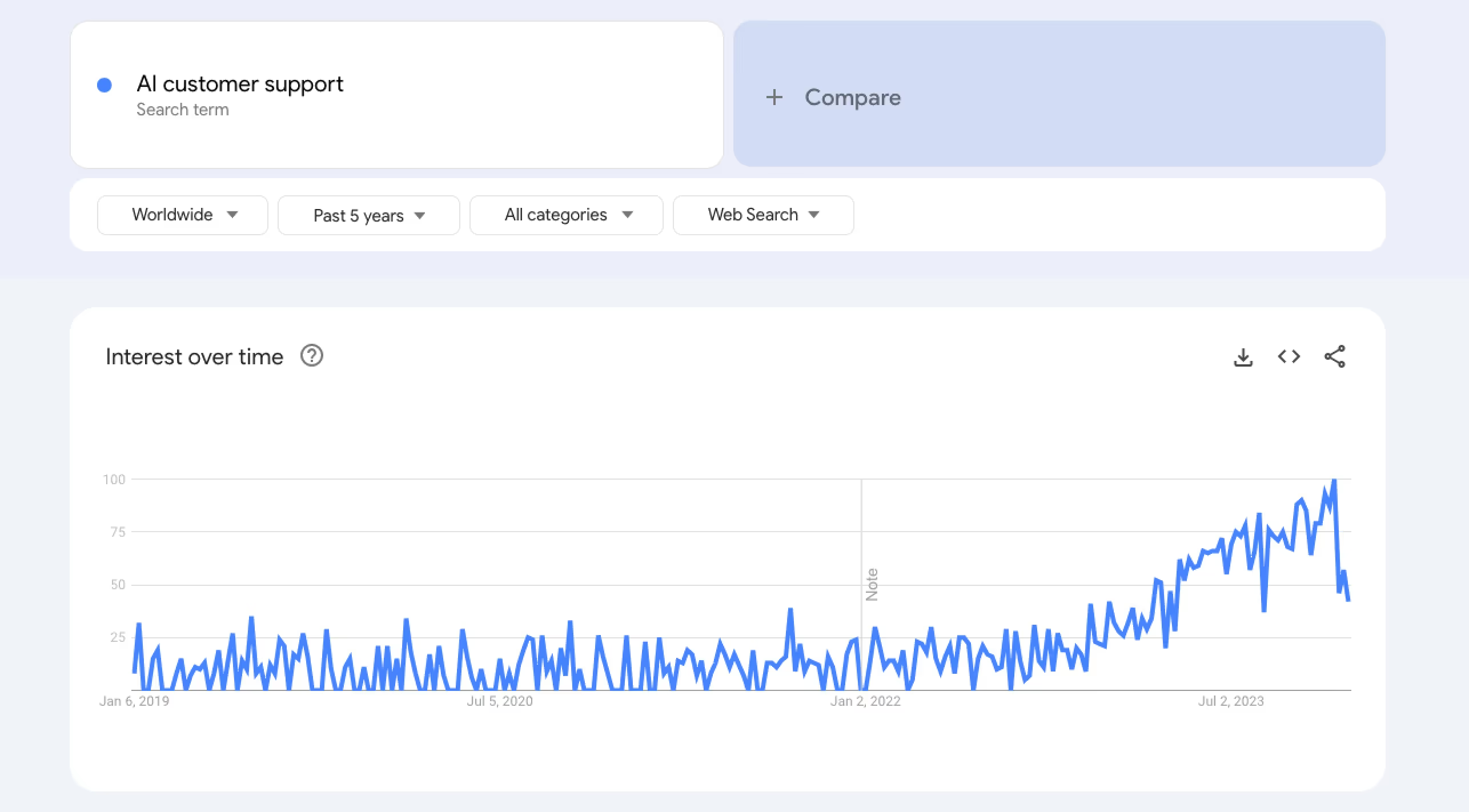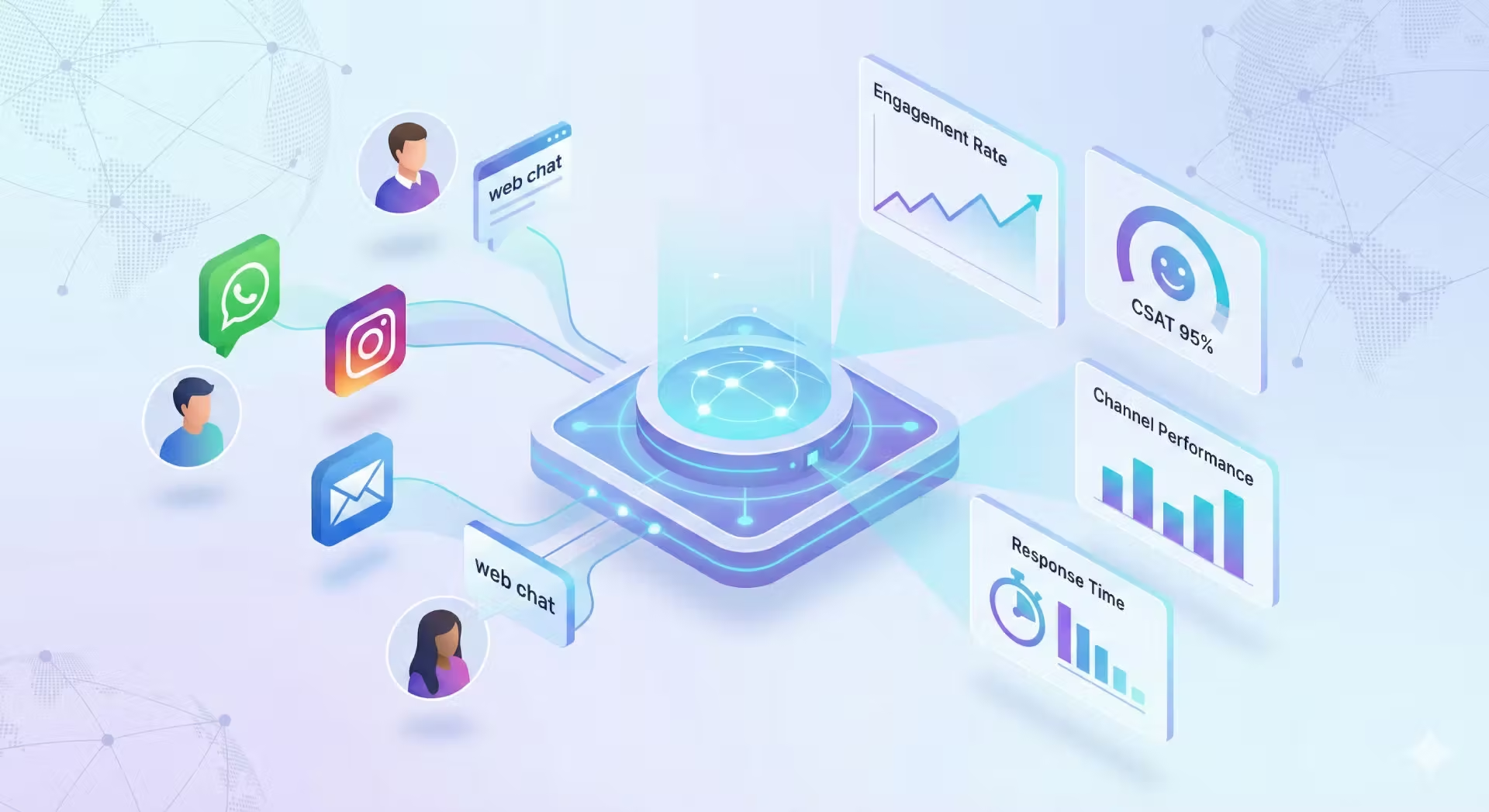As long as businesses have existed, so has customer service. If you and your competitor offer the same product, but you offer better customer service, people will buy from you. Sounds simple but, it’s not easy.
Early on, service was all about business-centric interactions. Simple business transactions and help during business hours. Now, it’s all about customer experience.
And with the rise of AI, a new wave of AI for customer service is emerging. If you want to ensure you offer the best service possible to win over new customers (and keep yours coming back), then you need to leverage AI-based customer support.
In this article, you’ll learn what AI-based customer service is, why it’s important, and how you can leverage AI technology to maintain a competitive advantage. Let’s start!
What Is AI-based customer support software?
Below you'll see a Google Trends snapshot from the past five years, highlighting the rapid growth of the term “AI customer support.”

What we've noticed is that searches for the term began skyrocketing last year, in 2023.
Why?
It was the year AI became mainstream after the release of Open AI’s ChatGPT in late 2022. AI is not a novelty anymore, tried by a small group of businesses. Now, if you want to differentiate with your support (and grow your business), you need to rely on AI to level up your customer service.
But, what exactly is AI based customer support software? Simply put, it’s any customer support software that’s built with AI and machine learning functionality. AI customer support tools do a few things to help you offer better support in less time:
- Automate repetitive tasks
- Automate responses with AI chatbots
- Offer personalised product recommendations
- Handle dozens of customer inquiries simultaneously
- Operate around the clock
Still early in their development, AI-based customer service tools main functionality is to speed up service and give you more time back. AI customer service tools are designed with machine learning capabilities that improve and adapt to their environment (and your goals) over time.
This means with every single interaction, the AI tool is learning what your customers are saying, the questions they’re asking, what their pain points are, and how to respond. These tools are constantly evolving to ensure you are able to help customers quicker, easier, and more effectively.
Most of all, AI will help you accomplish a lot at scale.
AI tools can be used to not only answer customers’ questions quickly, but they can also help you predict customer needs before they even arise. Leveraging AI-based customer support software is crucial for brands moving forward, as it allows you to automate and improve your customer support. Plus, you’re able to do it without having to expend many resources like time, money, and in-depth expertise (as long as you’re using the right tools).
Benefits of AI-based customer support
Using AI customer support software isn’t just about checking off a box. It’s not about being cool (although some of the tasks they can complete are mind-boggling). It’s about improving the way you help your customers. If AI-based customer support wasn’t helpful, businesses wouldn’t use it. But, they are. And AI-tool adoption rates are increasing drastically.
In 2023, the number of AI-tool users was over 250 million. By 2030, that number is expected to grow to 700 million, an increase of 280% in just seven years. Here are some of the reasons why AI-based customer support software can help you improve your business:
Efficiency and 24/7 availability
AI technology is all about improving your efficiency. If you can get more done in less time, why not?
AI-based customer support software helps you by offering 24/7 service to your customers. In a global marketplace, this means being able to reach someone halfway around the world even if your team is still sleeping in bed.
Customers can truly get solid service outside regular business hours. By setting up automated AI systems in place, you’re able to help your customers even if you (and your team) aren’t on the clock.
Improved customer satisfaction with quick and accurate responses
Not only can you help your customers at any time. But, AI customer service tools can also respond to your customers quicker. With trigger-based automations, and Live Chats, and AI Chatbots, you can answer customers faster than ever.
With advancements in technology, and natural language processing (NLP), AI is able to understand customer questions better and better. And, they’re able to respond with in-depth, personalised answers.
Scalability and cost-effectiveness for businesses
Let’s face it. The cost of labour is one of the biggest expenses for business owners. This is especially true for those looking to scale. If you want to grow your business, you need the right infrastructure to continue giving your customers the support they need. AI allows you to serve more customers by relying on technology, rather than manual labour.
This means you can save more on labour costs, and improve your opportunities to scale.
Personalisation in customer service
One of the most important benefits of AI in customer service is personalisation. You’ve likely been there before: you go to a website and have a question for customer service. But, all you can find is a chatbot. So, you ask it a question. And, it spits out a generic response that leaves you frustrated.
AI is able to accurately detect customer questions to be able to give relevant, personalised answers and even product recommendations.
This means when someone speaks to a chatbot, it will actually solve their information problem. The result is better service, a better customer experience, and higher conversions (which means more revenue for you).
How AI is transforming customer interactions
Just how exactly can you use AI to improve each customer interaction? Here are a few ways to use AI customer support software:
AI chatbots
The most common usage of AI in customer service is with AI chatbots. A chatbot is a helpful conversational tool that people can typically click on in the bottom right corner of a website to get some help. Rather than waiting to speak to a human, the visitor can ask their question to a chatbot.
In a short amount of time, AI chatbots have made the customer service experience quite impressive.
Not only can chatbots answer customer questions quicker, but they’re doing it more accurately as well. They’re also able to offer relevant products and services (doubling their jobs as salespeople). Meaning tickets will close faster, customers will be happier, and more sales will be made.
Interactive voice response (IVR)
Have you ever phoned a company to be greeted by a robotic voice? Well, those are ramping up and getting much more sophisticated.
An IVR is a system designed to automatically respond to someone who calls in. They can greet customers and address their concerns. With AI, these systems can use caller data like call history and previous inquiries to offer more personalised service (and speed up the time to ticket close).
Voice-to-text
Voice to text (and text to voice) give you the ability to convert customer inquiries into different content formats. This means if someone leaves a voicemail, you can use voice-to-text AI software to turn that into a transcript you can quickly read.
On the flip side, you can take customer’s text inquiries and convert it into voice if you want to listen to them on the go and detect tone. This means customer service teams can do their job better, since they’ll have better accessibility.
This is crucial for any customer support agents who have visual or hearing impairments.
Choosing the right AI customer service chatbot
AI tools can be a big help to give your customers better support. But, they’re not all created equal. Here are the key questions to answer before choosing an AI customer service chatbot:
Your support queries
- How effective is the AI chatbot at handling support queries?
- How much can you expect the AI bot to boost your automated resolution rate?
- How much faster is the AI bot’s answer speed?
- How accurate are the AI bot’s answers?
Setup time
- How quickly can you set up the AI customer service chatbot?
- Will it require training before it can provide real value to your support team?
- How quickly can you expect answers for customers right away?
- Will there be extended ongoing maintenance?
Tone and style
- Can the bot understand tone in customer inquiries?
- Can the bot respond in the correct tone back to customers?
- Are you able to trial or demo the bot to test its style before fully purchasing it?
Pricing
- What pricing model does the AI chatbot company use?
- Is it based on the message? Per resolution? Per deflection? Another method?
- What kind of ROI will you expect based on the pricing?
Integration with your tech stack
- Does the AI chatbot integrate with your current tech stack?
- Will you need to purchase any third-party tools to make it work?
- What kind of native integrations does the AI chatbot come with?
Data privacy and security
- Does the AI chatbot company have a partnership with a large language model (LLM) provider?
- How will customer data be used?
- Will the LLM provider retain the data?
Before you dive into any AI chatbot, remember to dive in deep. AI tools are constantly changing and improving. You should understand exactly what product you’re getting before you purchase it.
The future of customer service: AI and beyond
The AI customer support journey has just begun but, it’s moving fast. So what should you consider for the future of AI in customer service?
User adoption will continue to increase
The reality is that AI-adoption keeps rising. This means if you don’t have AI tools in your business (especially in customer service), you’re going to be the odd one out. AI powered customer service is the future. Customers will quickly begin to expect AI chatbots with advanced functionality.
With third-party cookies gone, it will be valuable first-party data
Third-party cookies are on their way out in 2024. This means businesses need new ways to collect customer data to understand them (and serve them better).
AI chatbots will be relied on heavily to collect first-party data about customers to ensure website owners can understand their target audience and their needs. Businesses that leverage AI chatbots in this respect will have an upper hand on the competition that doesn’t prepare for third-party cookies to disappear.
Personalisation and predictive accuracy
Personalisation is only going to improve with AI chatbots. Since AI chatbots are collecting first-party data on customers, they’ll get better at serving customers and their specific needs.
As customers share their problems, ask questions, and show their concerns with AI, the AI models will get better at recognising similar problems so they can give relevant answers. The result will be hyper personalisation. Think about walking into your favourite local shop. The shop owner recognises you, calls you by name, and says, “You want the usual?” That’s where AI chatbots are headed.
Challenges and considerations
The biggest advantages of AI-based customer service are also its biggest challenge:
1. Data
While it will be relied on to collect powerful data to better serve customers, the tough part is dealing with privacy concerns.
Different AI chatbot companies have different rules and regulations when it comes to data collection. Some companies will use the data you collect for their own purposes. Others won’t. It’s important you understand who has access to your customer data so you can ensure you’re meeting local laws and regulations.
2. Lack of human touch
Nothing can ever compete with a human-to-human connection. While AI is getting better with natural language sentiment analysis, to better understand what humans are saying, they still can’t replace a human support member.
Even though AI chatbots will get more human-like over time, there’s still nothing that will compare to getting service from another human. Make sure the AI you use can won't sound robotic. Because the lack of emotional connection is a downside in customer service.
Businesses will need to figure out just exactly how to leverage AI while still incorporating human elements in their touchpoints with customers. So find companies that offer options to change the tone of voice of AI chatbots for instance, to make automation sound branded and personal.
Use AI customer service to grow your business
AI-based customer support is evolving and improving at a rapid rate. If you want to ensure your business stays competitive in the marketplace, you need to ensure you’re leveraging AI in your customer service strategy.
With faster response times, round-the-clock support, and advanced personalisation, AI customer service can give you an edge up on the competition by offering better service. At Trengo, we’re breaking down the best practices on making AI and automation a core part of your engagement.




.png)











